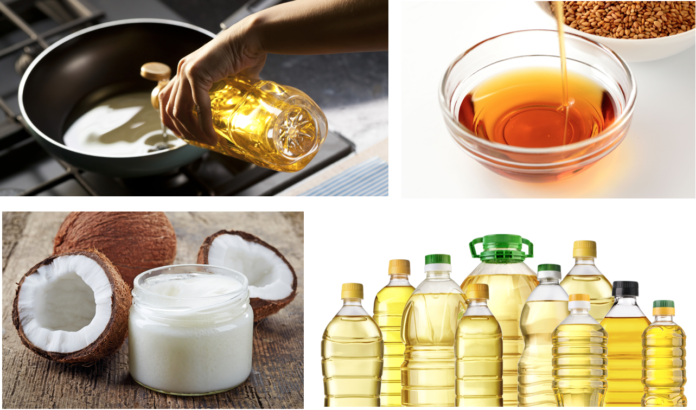Coconut and palm oil are both edible, vegetable oils derived from palm fruits are also widely used in personal care.
Depending on the level of processing and type of the oil, the nutritional composition may vary.
Macronutrients and Calories
Edible oils are overall not very diverse in nutrients. Coconut oil contains very little water, while palm oil is completely absent in water.
Coconut and palm oil have equal serving sizes: one tablespoon of oil weighting 13.6g.
Calories
Vegetable oils are very high in calories. Coconut and palm oil contain similar amounts of calories, however, coconut oil is a little higher.
One serving size of coconut oil contains 121 calories, while palm oil has 120.
Fats
Edible oils consist mostly of fats. Coconut oil consists of 99% fats, whereas palm oil is nearly 100% fat. A serving size of coconut oil contains 13.5g of fats.
The fat in coconut oil consists of 91% saturated fatty acids. Next by portion is monounsaturated fat, and last, polyunsaturated fatty acids.
Palm oil contains a lot more of monounsaturated and polyunsaturated fatty acids, however, saturated fat still makes up the majority.
The fat composition changes for partially hydrogenated oils, as poly- and monounsaturated fats turn into saturated fat.
Protein and Carbohydrates
Coconut and palm oil contain no protein or carbohydrates.
Vitamins
Both oils contain only two vitamins: Vitamin K and vitamin E. Palm oil is much richer in both of these
Minerals
Coconut and palm oil contain only trace amounts of minerals as well. However, coconut oil is higher in iron and choline compared to palm oil. It also contains small amounts of zinc and calcium, whereas palm oil does not.
Glycemic Index
As both coconut oil and palm oil contain no carbohydrates, their glycemic indices are equal to 0.
Acidity
Raw coconut is alkaline, however, through heating and further processing coconut oil becomes acidic with an average pH of 3.5 to 5.5.
Palm oil is also slightly acidic with a pH value of 6.34 on average.
Another way to look at the acidity of a food is by looking at the potential renal acid load (PRAL), which shows the capacity of the food to produce bases or acids.
The PRAL value for both coconut oil and palm oil is 0, making these oils neutral.
WEIGHT LOSS
Both coconut and palm oil are very high in calories, due to their high fat content. One tablespoon of these oils contains around 120 calories.
Despite its high caloric value, coconut oil is often claimed to aid weight loss. Most research doesn’t support the idea that coconut oil can lead to weight loss when used on it’s own. Coconut oil could increase high density lipoproteins and decrease the total cholesterol/ high density lipoprotein ratio in men with obesity, when used as a part of a low calorie, balanced diet. However, many studies have concluded that there is not enough consistent evidence that coconut oil has beneficial effects on energy metabolism, satiety or weight loss.
Studies on the association between palm oil consumption and weight loss have not achieved significant results as well. There is also insufficient evidence to claim palm oil’s superior qualities over other vegetable oils in obesity management.
HEALTH IMPACT
In this section, we will discuss what effects coconut oil and palm oil have on human health and how these effects compare to each other.
Health Benefits
Cardiovascular Health
One meta analysis concluded that although coconut oil increases high density lipoproteins (also known as “good” cholesterol), that effect was not enough to make up for the negative effects caused by coconut oil’s property of raising low density lipoproteins (“bad” cholesterol). In contrast to this, another study found that daily consumption of moderate amounts of coconut oil raises high density lipoproteins and shows no significant harmful side effects.
Coconut oil also significantly increased total cholesterol and low density lipoprotein cholesterol concentrations compared with palm oil, as well as other vegetable oils, due to the high saturated fat content.
However, in comparison to animal oils, coconut oil demonstrated more favourable changes in blood lipid profile, lowering low density lipoproteins. Virgin coconut oil performed the best results.
Some research, carried out on animals, has concluded that coconut oil is associated with an improvement in antioxidant activity, lipid profile, blood pressure, blood sugar and abdominal body fat. These effects still have to be studied in humans.
Meta analyses on the topic of palm oil consumption have concluded that it does not have incremental risks for cardiovascular disease or cardiovascular disease related mortality.
Diabetes
Multiple studies have found that coconut oil, especially virgin coconut oil, may ameliorate lipid profiles in diabetes mellitus type 2, as well as support normal glucose homeostasis and modulate the immune response. Virgin coconut oil may also be used as a functional food to prevent the development of diet-induced insulin resistance and associated complications, potentially due to its antioxidant qualities.
Some studies show that substitution with red palm oil as an antioxidant may reduce blood glucose in diabetic patients. However, others have not found significant effects of palm oil on biomarkers of glucose metabolism.
Cancer
Coconut oil has expressed antiproliferative and pro-apoptotic responses in tumor cells. Virgin coconut oil, as well as processed and fractionated coconut oil, have shown anticancer activities, especially against liver and oral cancer. Moreover, virgin coconut oil consumption during chemotherapy may also improve quality of life for breast cancer patients.
As for palm oil consumption and cancer correlation, there is no evidence associating palm oil intake and a higher risk of cancer, incidence or mortality in humans.
Downsides and Risks
Cardiovascular Health
American Heart Association has found that due to high saturated fats, coconut oil raises low density lipoproteins, which can pose a risk for atherosclerotic cardiovascular diseases (9).
The use of repeatedly heated palm oil, as well as other oils, is also a predisposing factor of atherosclerosis and the consequent cardiovascular issues.
Environmental Issues
The widespread palm oil production can cause environmental hazards that negatively affect not only nature but also our health. Large-scale palm oil production leads to deforestation, not only destroying the habitats of endangered species, but also leading to an increase of greenhouse gases in the atmosphere, further contributing to climate change.
SUMMARY
In summary, coconut oil and palm oil are both high calorie foods, consisting mostly of fats. Coconut oil is a little higher in calories, while palm oil contains a little more fats. Both completely lack protein and carbohydrates and are low in micronutrients. However, coconut oil is relatively richer in minerals, whilst palm oil contains more vitamin E and vitamin K.
Research suggests that palm oil is a healthier choice than coconut oil when it comes to cardiovascular health, due to a lower saturated fat content. Both can have positive effects for people with diabetes type 2.
Overall, these oils can be healthy when used in moderation and as part of a healthy diet.
Source: foodstruct.com








